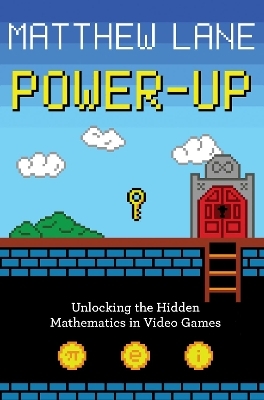
Power-Up
Princeton University Press (Verlag)
978-0-691-16151-8 (ISBN)
A fun and lively look at the mathematical ideas concealed in video games Did you know that every time you pick up the controller to your PlayStation or Xbox, you are entering a game world steeped in mathematics? Power-Up reveals the hidden mathematics in many of today's most popular video games and explains why mathematical learning doesn't just happen in the classroom or from books--you're doing it without even realizing it when you play games on your cell phone. In this lively and entertaining book, Matthew Lane discusses how gamers are engaging with the traveling salesman problem when they play Assassin's Creed, why it is mathematically impossible for Mario to jump through the Mushroom Kingdom in Super Mario Bros., and how The Sims teaches us the mathematical costs of maintaining relationships. He looks at mathematical pursuit problems in classic games like Missile Command and Ms. Pac-Man, and how each time you play Tetris, you're grappling with one of the most famous unsolved problems in all of mathematics and computer science.
Along the way, Lane discusses why Family Feud and Pictionary make for ho-hum video games, how realism in video games (or the lack of it) influences learning, what video games can teach us about the mathematics of voting, the mathematics of designing video games, and much more. Power-Up shows how the world of video games is an unexpectedly rich medium for learning about the beautiful mathematical ideas that touch all aspects of our lives--including our virtual ones.
Matthew Lane is a mathematician and cofounder of Rithm, a school for aspiring web developers. He is also the creator of Math Goes Pop!, a blog that explores the interconnections between mathematics and popular culture. He lives in San Francisco.
Acknowledgments xi Introduction 1 1. Let's Get Physical 7 1.1 Platforming Perils 7 1.2 Platforming in Three Dimensions 10 1.3 LittleBigPlanet: Exploring Physics through Gameplay 12 1.4 From 2D to 3D: Bending Laws in Portal 14 1.5 Exploring Reality with A Slower Speed of Light 18 1.6 Exploring Alternative Realities 21 1.7 Beyond Physics: Minecraft or Mine Field? 26 1.8 Closing Remarks 27 1.9 Addendum: Describing Distortion 29 2. Repeat Offenders 34 2.1 Let's Play the Feud! 34 2.2 Game Shows and Birthdays 36 2.3 Beyond the First Duplicate 39 2.4 The Draw Something Debacle 41 2.5 Delayed Repetition: Increasing N 46 2.6 Delayed Repetition:Weight Lifting 48 2.7 The Completionist's Dilemma 53 2.8 Closing Remarks 55 2.9 Addendum: In Search of a Minimal k 55 3. Get Out the Voting System 58 3.1 Everybody Votes, but Not for Everything 58 3.2 Plurality Voting: An Example 60 3.3 Ranked-Choice Voting Systems and Arrow's Impossibility Theorem 61 3.4 An Escape from Impossibility? 66 3.5 Is There a "Best" System? 68 3.6 What Game Developers Know that Politicians Don't 71 3.7 The Best of the Rest 76 3.8 Closing Remarks 82 3.9 Addendum: TheWilson Score Confidence Interval 83 4. Knowing the Score 86 4.1 Ranking Players 86 4.2 Orisinal Original 87 4.3 What's in a Score? 91 4.4 Threes! Company 98 4.5 A Mathematical Model of Threes! 100 4.6 Invalid Scores 105 4.7 Lowest of the Low 109 4.8 Highest of the High 116 4.9 Closing Remarks 121 5. The Thrill of the Chase 122 5.1 I'ma GonnaWin! 122 5.2 Shell Games 123 5.3 Green-Shelled Monsters 125 5.4 Generalizations and Limitations 129 5.5 Seeing Red 131 5.6 Apollonius Circle Pursuit 134 5.7 Overview of aWinning Strategy 136 5.8 Pinpointing the Intersections 141 5.9 Blast Radius 145 5.10 The Pursuer and Pursued in Ms. Pac-Man 148 5.11 Concluding Remarks 153 5.12 Addendum: The Pursuit Curve for Red Shells and a Refined Inequality 153 6. Gaming Complexity 158 6.1 From Russia with Fun 158 6.2 P, NP, and Kevin Bacon 160 6.3 Desktop Diversions 165 6.4 Platforming Problems 169 6.5 Fetch Quests: An Overview 170 6.6 Fetch Quests and Traveling Salesmen 175 6.7 Closing Remarks 183 7. The Friendship Realm 184 7.1 Taking It to the Next Level 184 7.2 Friendship as Gameplay: The Sims and Beyond 186 7.3 A Game-Inspired Friendship Model 190 7.4 Approximations to the Model 193 7.5 The Cost of Maintaining a Friendship 195 7.6 From Virtual Friends to Realistic Romance 198 7.7 Modeling Different Personalities 200 7.8 Improving the Model (Again!) 203 7.9 Concluding Remarks 209 8. Order in Chaos 210 8.1 The Essence of Chaos 210 8.2 Love in the Time of Chaos 211 8.3 Shell Games Revisited 216 8.4 How's theWeather? 223 8.5 Concluding Remarks 225 9. The Value of Games 227 9.1 More Important Than Math 227 9.2 Why Games? 230 9.3 What Next? 242 Notes 244 Bibliography 269 Index 273
| Erscheinungsdatum | 25.05.2017 |
|---|---|
| Zusatzinfo | 80 halftones. 50 line illus. |
| Verlagsort | New Jersey |
| Sprache | englisch |
| Maße | 152 x 235 mm |
| Gewicht | 709 g |
| Themenwelt | Informatik ► Software Entwicklung ► Spieleprogrammierung |
| Mathematik / Informatik ► Mathematik ► Geschichte der Mathematik | |
| ISBN-10 | 0-691-16151-8 / 0691161518 |
| ISBN-13 | 978-0-691-16151-8 / 9780691161518 |
| Zustand | Neuware |
| Haben Sie eine Frage zum Produkt? |
aus dem Bereich


